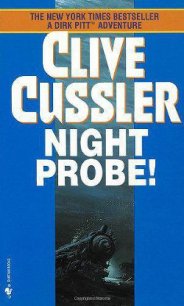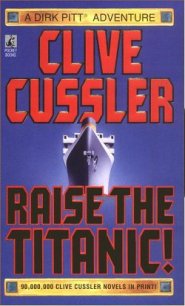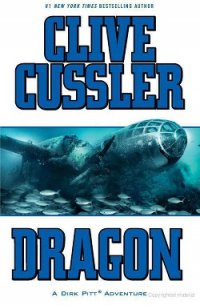Plague Ship - Cussler Clive (полные книги .TXT) 📗
“You just admitted killing almost eight hundred people and you say you’re not a monster?” Kovac actually smiled. “Very well. Dr. Lydell Cooper isn’t a monster. The virus we are about to release will cause nothing more than a bad fever, only there is one small side effect. Sterility. In a few months, half of the world’s population is going to discover that it can’t have children.” Linda felt like she was going to throw up. Mark actually swayed on his feet when he grasped the insidious nature of their plot. Responsivists were always going on about how the planet was doomed because of overpopulation. Now they were planning on doing something about it.
“You can’t do this,” Linda cried.
Kovac leaned his face in inches from hers. “It is already done.” THE GUARDS SEARCHING Eos Island stopped their work and gazed heavenward. What at first looked like a particularly bright star quickly grew in size and intensity until it seemed to fill the entire sky.
And what started as mild unease quickly exploded into panic, as the object plunging from space appeared to be aimed at the island. They ran, for when faced with danger it is what instinct compels humans to do, but it made no difference. There was no escape.
Down in the transmitter room, Thom Severance tapped his foot impatiently against a table leg as the display in front of him showed the agonizingly slow pace of the ELF signal being sent around the globe. In few minutes, it would be done. The first of the virus would flood out of its vacuum-sealed containers and into the washing machines where it would contaminate the sheets, towels, and napkins. That precise amount of virus would be released into each load of laundry, thereafter, until the dewars were emptied.
A faint smile lifted the corners of his mouth.
The tungsten projectile hit Eos island almost dead center, three miles from the subterranean base. Its tremendous speed and weight turned the potential energy of falling two hundred miles into the kinetic energy of a massive explosion.
The center of the island blinked out of existence. The rock was torn apart at the molecular level, so there remained virtually no trace of it at all. As the blast rippled outward, it sent a shock wave through the island that heaved hundreds of tons of rubble into the air. Much of the rock was melted into glowing globules of lava that snapped and hissed when they plunged into the cool sea.
The panicked guards were carbonized, their ashes mixing with the dust and debris.
When the shock wave hit the facility, the hardened ferroconcrete used in its construction cracked like fine porcelain. The building didn’t collapse but rather was uprooted and thrown out of the ground. Walls, ceilings, and floors pancaked on themselves, crushing everyone inside. The destruction was absolute. The miles of thick copper wire that was the ELF antenna were ripped from the earth and melted into streams of liquid metal that poured into the ocean.
The earth shook so fiercely that huge slabs of cliff face sheared away, and cracks spidering out from the impact’s epicenter split the island into seven smaller ones.
A massive tidal wave surged off Eos in the direction the Orbital Ballistic Projectile had been traveling.
Unlike a tsunami, which travels below the surface and grows in height only as it shoals, this was a solid wall of water with a frothing crest that seemed to curl forever. It roared as though the gates of hell had been thrown open and raced across the sea at astronomical speeds. The wave wouldn’t last. Friction would eventually reduce its size until it wasn’t even a ripple, but, for as long as it lasted, it was the most destructive force on the planet.
Forty miles away, the Oregon was racing with everything she had. All her hatches had been doubly secured. Her two submersibles had been lowered into their cradles and lashed down. Every loose object the crew could think of had been stuffed into closets and drawers. They knew they weren’t going to get out of this without some damage, but they wanted to keep it to a minimum.
“Time till impact?’ Juan asked.
“I estimate five minutes,” the helmsman reported.
Juan hit the button for the shipwide PA system. “This is the Chairman. Everyone hold on tight. We’re in for a wild ride. Five minutes.”
The mast-mounted camera was turned aft and switched to night vision mode so they could watch the wave coming at them. It filled the sea from horizon to horizon, impenetrable, implacable. Its face was veined with emerald lines of phosphorus, and its crest looked like green fire.
“I have the conn,” Juan said suddenly, and took command of his ship.
He had noticed they were running from the wave at a slight angle and gave the Oregon a bit of rudder by way of correction. If they were going to ride this out, they needed to take the hit directly on the stern.
Any deviation and the five-hundred-foot ship would auger into the wave and roll a dozen times before being released from its grip.
“Here we go!”
It was like an express elevator. The stern came up so fast that, for a moment, there was no water under her middle. The sound of the hull’s moaning was lost in the savage roar of the wave. The bow plunged into the sea. Juan cut power to keep her from burying her prow, and then the entire ship was dragged up the face of the wave. The acceleration sent everyone lurching forward. The ship climbed the wave, her bow pointing down at a dizzying angle. Juan glanced at their speed through the water, which was down to four knots, but their speed over bottom was nearly seventy miles an hour.
The stern burst through the wave’s crest in an explosion of froth that swamped the decks. Water sluiced from the scuppers in sheets and blasted from the drive tubes in solid white jets. Thirty, forty, fifty feet of Oregon’s stern hung suspended over the back of the wave before she began to tip. And then she went over, falling faster than when she’d been plucked off the surface.
Cabrillo fire-walled the engines, asking his ship to give him everything she had. When they hit the bottom of the wave, her stern would knife through the surface, and if the Oregon didn’t have enough power she would simply keep going until the ocean closed over her bow.
With the ship at an almost sixty-degree angle, the fantail splashed into the rough water in the wave’s trailing edge, and vanished. The sea climbed over the rearmost cargo hatch, and, had it not been for the thick rubber seals, the helicopter hangar under it would have swamped.
“Come on, girl,” Juan cajoled, watching the water claim more and more of his ship. “You can do it.” The angle began to flatten out as the bow came off the wave, and Oregon’s plunge into the abyss seemed in check. For a long moment, she neither sank nor rose out of the water. The vessel shuddered with the strain of her engines trying to deadlift eleven thousand tons from the sea’s crushing embrace.
And slowly, so slowly at first that Juan wasn’t sure he was seeing it right on the monitors, the deck began to clear. The leading edge of the stern hatch appeared as the magnetohydrodynamics thrust her out of what should have been her watery grave.
Cabrillo finally joined the chorus of whistles and cheers when he saw the sodden Iranian flag hanging off her jack staff. He eased off the power and turned control back over to the helmsman.
Max sidled up to his chair. “And I thought you were crazy jumping an ATV off a dock. Any other ship would have turtled on a wave like that.”
“This isn’t any other ship,” Juan said, and patted Max’s arm. “Or any other crew, for that matter.”
“Thank you,” Max said simply.
“I’ve got one of my wayward children home. It’s time to get the other two.” CHAPTER 39
KOVAC KNEW THERE WAS TROUBLE WHEN HE TRIED TO reach Thom Severance from the Golden Sky’s radio room and got no response. He didn’t even get a ring.




